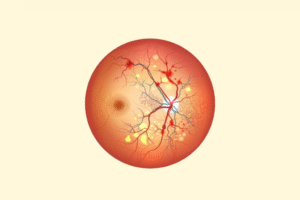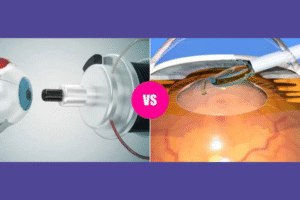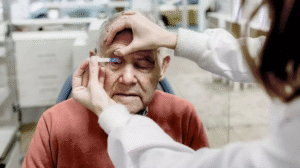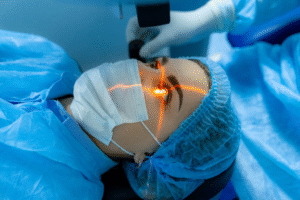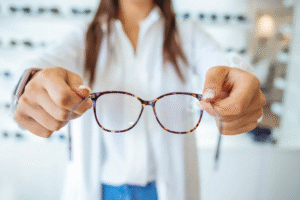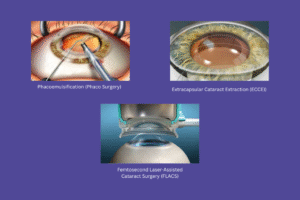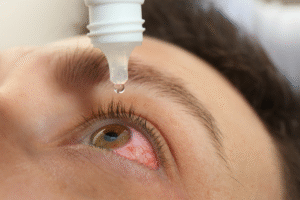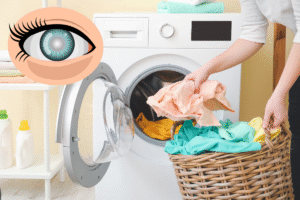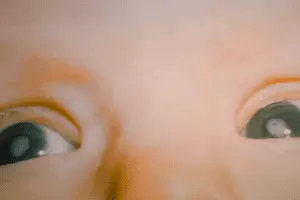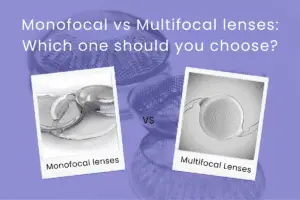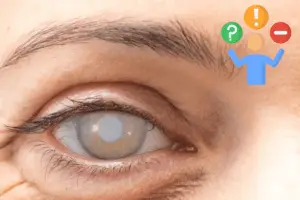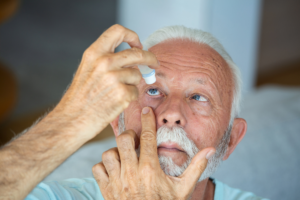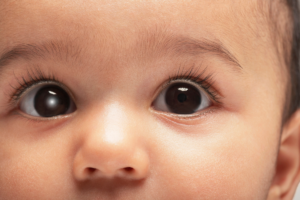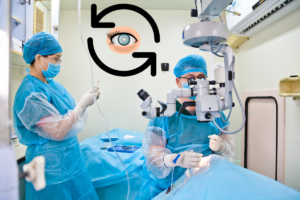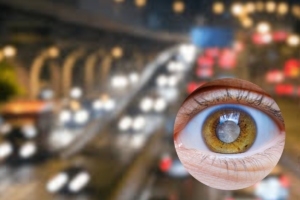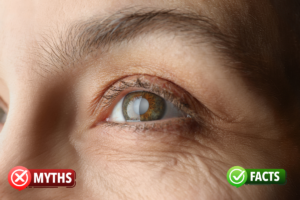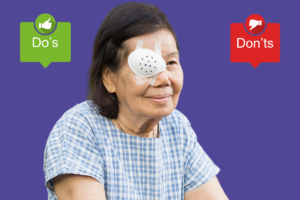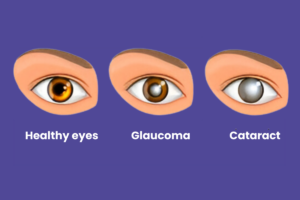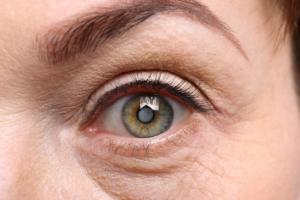Can cataract be cured by eye drops?

Cataracts are one of the leading causes of vision loss worldwide, especially among older adults. When diagnosed with cataracts, many people wonder if they can be treated with eye drops instead of undergoing surgery. While research on cataract-dissolving eye drops is ongoing, surgery remains the only proven and effective treatment for cataracts.
In this blog, we will explore whether eye drops can cure cataracts, the research in this area, and why surgery is still the best treatment option.
Table of Contents
ToggleUnderstanding cataracts: What happens to your eyes?
A cataract occurs when the natural lens of the eye becomes cloudy, leading to blurry vision, light sensitivity, and difficulty seeing at night. This clouding happens due to the breakdown and clumping of proteins in the lens, a process that typically occurs due to aging but can also be caused by diabetes, UV exposure, smoking, or certain medications.
Since the cataract forms inside the lens, the only way to restore clear vision is to remove the affected lens and replace it with an artificial intraocular lens (IOL). Currently, no approved medication or eye drops can reverse this process.
Do cataract eye drops work?
In recent years, scientists have been researching eye drops that could potentially dissolve cataracts or stop their progression. Some experimental studies have shown promising results, but no eye drop treatment has been proven effective in completely curing cataracts in humans.
Types of cataract eye drops under research:
1. Lanosterol-based eye drops:

🔬 The research: A 2015 study on animals suggested that lanosterol, a naturally occurring compound in the body, might help break down cataract-forming protein clumps. This research sparked excitement about a potential non-surgical treatment.
🔗 According to Optometry Times (source), scientists have been working on developing lanosterol-based eye drops that could help reverse cataract formation, at least in its early stages.
🧐 The problem: While lanosterol has shown some effectiveness in animals, it has not been proven to work in humans. The human eye lens is thicker and more complex than animal lenses, making it difficult for the compound to penetrate deeply enough to dissolve cataracts.
2. N-Acetylcarnosine (NAC) eye drops:

NAC eye drops are often marketed as “cataract-reducing” drops. These drops contain antioxidants that may slow down cataract progression.
🧐 The truth:
- NAC may help delay the worsening of cataracts but cannot reverse or remove them.
- There is no strong scientific evidence proving that NAC drops can dissolve cataracts.
- The FDA and major health organizations have not approved NAC eye drops as a treatment for cataracts.
3. Other investigational compounds:
Researchers continue to study different molecules that might help prevent or reduce cataracts, but as of today, no eye drop has been found to be an effective replacement for surgery.
Are cataract eye drops a scam?
Some over-the-counter eye drops claim to “cure” cataracts, but no scientifically proven eye drops currently exist. The FDA and other regulatory bodies have not approved any eye drops as an alternative to cataract surgery. Patients should be cautious of misleading marketing claims and always consult an ophthalmologist before using such products.
Why is surgery still the best treatment for cataracts?

Advantages of cataract surgery over eye drops:
1. Permanent solution:
- Cataract surgery completely removes the clouded lens and replaces it with a clear artificial lens, restoring vision permanently.
- Eye drops, even if effective in the future, may only delay cataract progression, not remove it.
2. Fast & Safe procedure:
- Modern cataract surgery takes only 15-30 minutes per eye and is performed under local anesthesia.
- Patients can return home the same day and resume normal activities within a few days.
3. Immediate improvement in vision:
- Most patients notice significant improvement in vision within 24-48 hours after surgery.
- In contrast, eye drops (if they work in the future) may take months or even years to show noticeable effects.
4. Corrects other vision problems:
- Cataract surgery allows patients to choose premium intraocular lenses (IOLs) that can correct refractive errors like nearsightedness, farsightedness, and astigmatism.
- This means some patients may no longer need glasses after surgery.
5. No proven alternative available yet:
- While cataract-dissolving eye drops are being studied, they are not currently a reliable or approved treatment.
- Surgery remains the only FDA-approved method to effectively treat cataracts.
Conclusion
If you or a loved one has been diagnosed with cataracts, waiting for eye drops to become a proven treatment is not advisable. Cataract surgery is a safe, painless, and highly effective solution that restores clear vision immediately.
While research on eye drops continues, they are not a viable alternative to surgery at this time. If you are experiencing symptoms of cataracts, consult an experienced ophthalmologist to discuss the best treatment options.
Would you like to schedule a consultation with Krisha Eye Hospital? Contact us today for expert eye care and personalized treatment options.
Author bio
Dr. Dhwani Maheshwari, an esteemed ophthalmologist with over 10 years of experience, leads Krisha Eye hospital in Ahmedabad with a commitment to advanced, patient-centered eye care. Specializing in cataract and refractive surgery, Dr. Maheshwari has performed more than a thousand successful surgeries. Her expertise lies in phacoemulsification, a technique recognized for its precision in cataract treatment.
Dr. Maheshwari’s educational journey includes an MBBS from Smt. NHL MMC, a DOMS from M & J Institute of Ophthalmology, and a DNB in Ophthalmology from Mahatme Eye Bank Eye Hospital, Nagpur. She also completed a fellowship in phacoemulsification at Porecha Blindness Trust Hospital, further enhancing her surgical skills. In addition to her work at Krisha Eye Hospital, Dr. Maheshwari serves as a consultant ophthalmologist at Northstar Diagnostic Centre.
Under her leadership, Krisha Eye Hospital aims to bring all superspecialties under one roof, offering comprehensive eye care solutions for all vision needs.
FAQs
Currently, cataract surgery is the only proven treatment. While research on eye drops is ongoing, no medication has been approved to reverse cataracts.
No, there are no FDA-approved eye drops that can cure or dissolve cataracts. Only cataract surgery can effectively restore vision.
Lanosterol-based eye drops have shown promise in animal studies, but they are not yet proven for human use. More research is needed before they can be considered a viable treatment.
NAC eye drops may slow the progression of cataracts, but they cannot dissolve or remove cataracts. They are not a replacement for surgery.
If you have cataracts that affect your daily life, waiting for eye drops is not advisable. Cataract surgery is a safe and effective solution that provides immediate vision improvement.
No, cataracts do not heal or go away on their own. They tend to worsen over time, leading to further vision loss.
There are no proven home remedies to cure cataracts. A healthy diet and UV protection can help slow their progression, but surgery is the only effective cure.
Future research may develop effective non-surgical treatments, but as of today, surgery remains the only reliable solution for cataracts.
If your cataract is mild and does not affect your daily life, you can wait. But once it starts interfering with vision, delaying surgery is not advisable. Cataracts only get worse over time.
It depends. Standard IOLs restore clear vision, but you may still need reading glasses. However, premium IOLs can correct vision issues like nearsightedness or astigmatism, reducing or eliminating your need for glasses. For a more detailed explanation, check out our blog: Will I need glasses after cataract surgery?
Most over-the-counter eye drops marketed for cataracts do not have serious side effects, but they also do not cure cataracts. Some people may experience:
- Temporary eye irritation
- Redness or mild discomfort
- No improvement in vision (because the cataracts remain unchanged)
Always consult an ophthalmologist before using any eye drops.
No. If cataracts are mild and do not affect vision significantly, surgery is not immediately needed. However, once they start interfering with daily life (e.g., driving, reading, or recognizing faces), surgery is the best solution.
No, cataracts do not grow back after surgery. However, some people may develop posterior capsule opacification (PCO), which causes blurry vision. This can be quickly treated with a simple laser procedure – YAG laser capsulotomy.
Cataract eye drops may be used before surgery to manage symptoms but cannot replace surgery. After surgery, prescribed medicated eye drops help with healing and preventing infection.



